
Books about Long-Term thinking
Books about Long-Term thinking
Books about long term thinking or of interest to Long Now London regulars. For more regular updates and to hear about what we're talking about at the meetups, sign up to our Substack.
Books about long term thinking or of interest to Long Now London regulars. For more regular updates and to hear about what we're talking about at the meetups, sign up to our Substack.
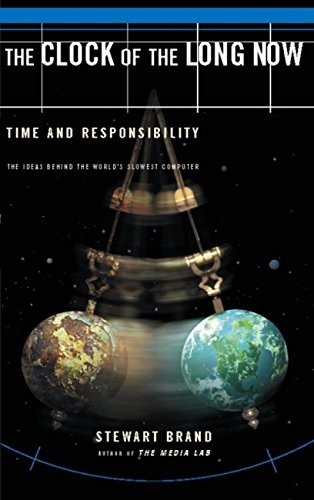
The Clock of the Long Now
Stewart Brand, 02000
Using the designing and building of the Clock of the Long Now as a framework, this is a book about the practical use of long time perspective: how to get it, how to use it, how to keep it in and out of sight.
Get it on
Archive.org
ABE Books
Amazon

The Clock of the Long Now
Stewart Brand, 02000
Using the designing and building of the Clock of the Long Now as a framework, this is a book about the practical use of long time perspective: how to get it, how to use it, how to keep it in and out of sight.
Get it on
Archive.org
ABE Books
Amazon

The Clock of the Long Now
Stewart Brand, 02000
Using the designing and building of the Clock of the Long Now as a framework, this is a book about the practical use of long time perspective: how to get it, how to use it, how to keep it in and out of sight.
Get it on
Archive.org
ABE Books
Amazon
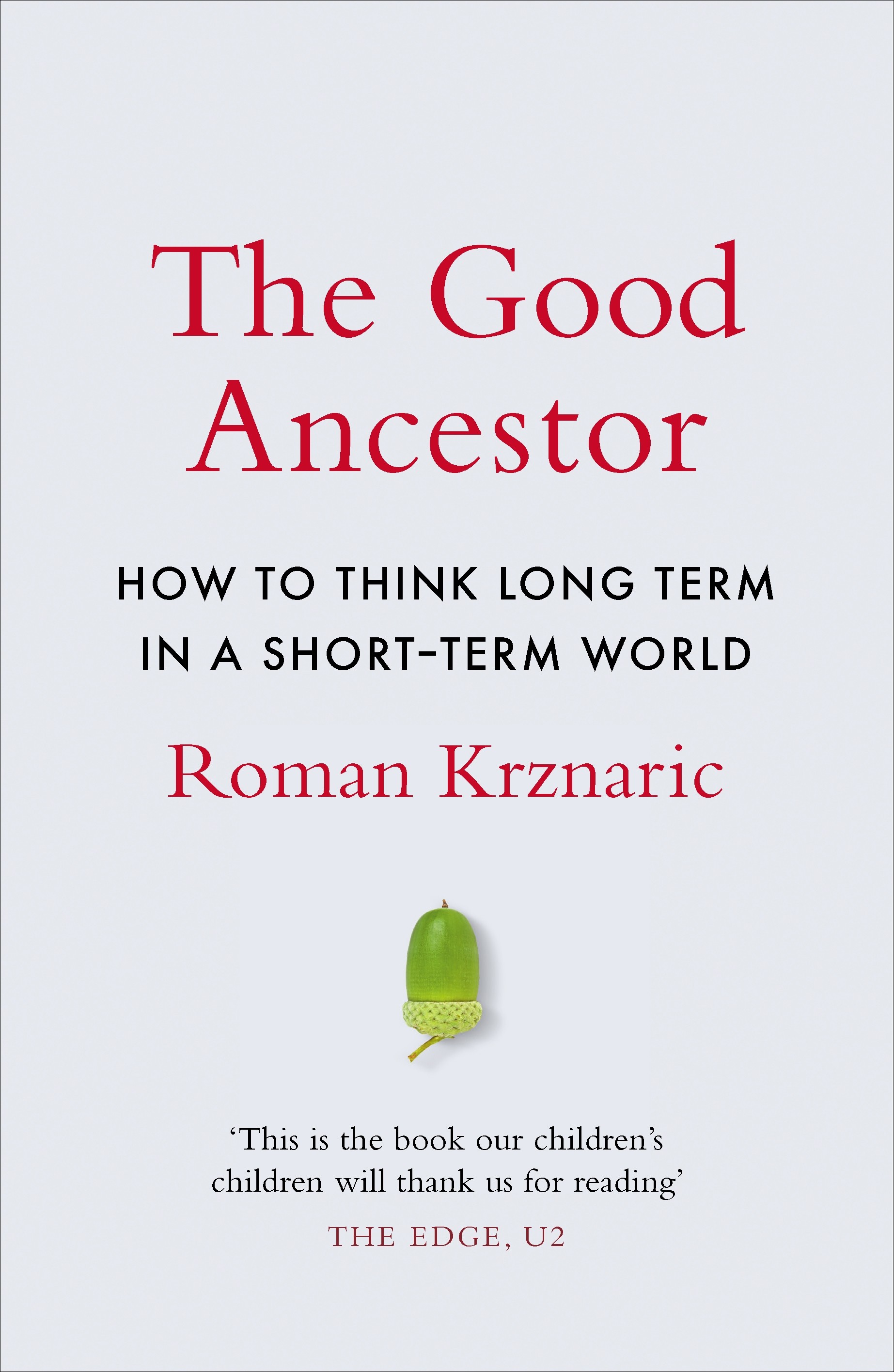
The Good Ancestor
Roman Krznaric, 02021
From the first seeds sown thousands of years ago, to the construction of the cities we still inhabit, to the scientific discoveries that have ensured our survival, we are the inheritors of countless gifts from the past. Today, in an age driven by the tyranny of the now, with 24/7 news, the latest tweet, and the buy-now button commanding our attention, we rarely stop to consider how our actions will affect future generations.

The Good Ancestor
Roman Krznaric, 02021
From the first seeds sown thousands of years ago, to the construction of the cities we still inhabit, to the scientific discoveries that have ensured our survival, we are the inheritors of countless gifts from the past. Today, in an age driven by the tyranny of the now, with 24/7 news, the latest tweet, and the buy-now button commanding our attention, we rarely stop to consider how our actions will affect future generations.

The Good Ancestor
Roman Krznaric, 02021
From the first seeds sown thousands of years ago, to the construction of the cities we still inhabit, to the scientific discoveries that have ensured our survival, we are the inheritors of countless gifts from the past. Today, in an age driven by the tyranny of the now, with 24/7 news, the latest tweet, and the buy-now button commanding our attention, we rarely stop to consider how our actions will affect future generations.
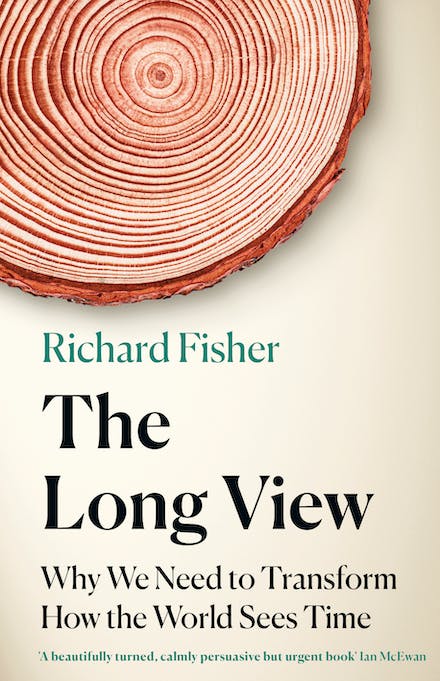
The Long View
Richard Fisher, 02023
Humans are unique in our ability to understand time, able to comprehend the past and future like no other species. Yet modern-day technology and capitalism have supercharged our short-termist tendencies and trapped us in the present, at the mercy of reactive politics, quarterly business targets and 24-hour news cycles

The Long View
Richard Fisher, 02023
Humans are unique in our ability to understand time, able to comprehend the past and future like no other species. Yet modern-day technology and capitalism have supercharged our short-termist tendencies and trapped us in the present, at the mercy of reactive politics, quarterly business targets and 24-hour news cycles

The Long View
Richard Fisher, 02023
Humans are unique in our ability to understand time, able to comprehend the past and future like no other species. Yet modern-day technology and capitalism have supercharged our short-termist tendencies and trapped us in the present, at the mercy of reactive politics, quarterly business targets and 24-hour news cycles
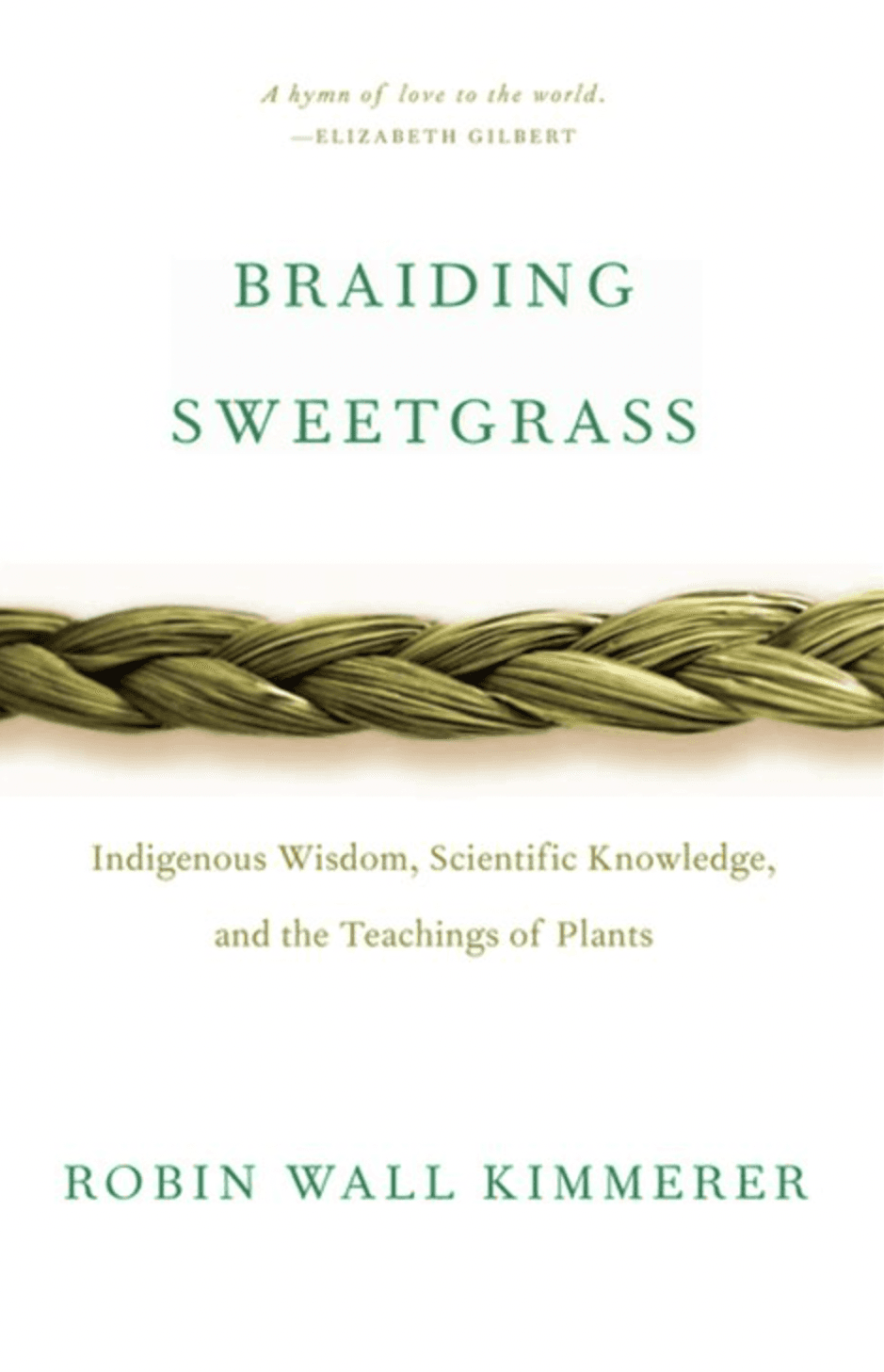
Braiding Sweetgrass
Robin Wall Kimmerer, 02015
As a botanist, Robin Wall Kimmerer asks questions of nature with the tools of science. As a member of the Citizen Potawatomi Nation, she embraces indigenous teachings that consider plants and animals to be our oldest teachers. Kimmerer brings these two lenses of knowledge together to take "us on a journey that is every bit as mythic as it is scientific, as sacred as it is historical, as clever as it is wise" (Elizabeth Gilbert).

Braiding Sweetgrass
Robin Wall Kimmerer, 02015
As a botanist, Robin Wall Kimmerer asks questions of nature with the tools of science. As a member of the Citizen Potawatomi Nation, she embraces indigenous teachings that consider plants and animals to be our oldest teachers. Kimmerer brings these two lenses of knowledge together to take "us on a journey that is every bit as mythic as it is scientific, as sacred as it is historical, as clever as it is wise" (Elizabeth Gilbert).

Braiding Sweetgrass
Robin Wall Kimmerer, 02015
As a botanist, Robin Wall Kimmerer asks questions of nature with the tools of science. As a member of the Citizen Potawatomi Nation, she embraces indigenous teachings that consider plants and animals to be our oldest teachers. Kimmerer brings these two lenses of knowledge together to take "us on a journey that is every bit as mythic as it is scientific, as sacred as it is historical, as clever as it is wise" (Elizabeth Gilbert).
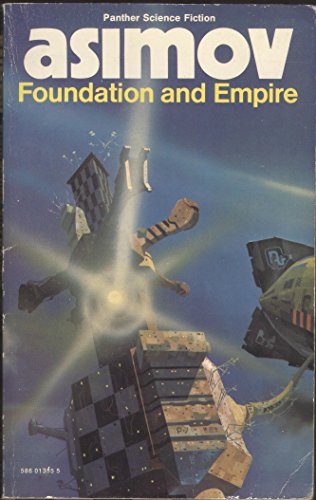
The Foundation Trilogy
Isaac Asimov, 01942 - 01950
The Foundation series is Isaac Asimov’s iconic masterpiece. Unfolding against the backdrop of a crumbling Galactic Empire, the story of Hari Seldon’s two Foundations is a lasting testament to an extraordinary imagination, one that shaped science fiction as we know it today.

The Foundation Trilogy
Isaac Asimov, 01942 - 01950
The Foundation series is Isaac Asimov’s iconic masterpiece. Unfolding against the backdrop of a crumbling Galactic Empire, the story of Hari Seldon’s two Foundations is a lasting testament to an extraordinary imagination, one that shaped science fiction as we know it today.

The Foundation Trilogy
Isaac Asimov, 01942 - 01950
The Foundation series is Isaac Asimov’s iconic masterpiece. Unfolding against the backdrop of a crumbling Galactic Empire, the story of Hari Seldon’s two Foundations is a lasting testament to an extraordinary imagination, one that shaped science fiction as we know it today.
Books by Pace Layer
Books by Pace Layer
Stewart Brand's pace layers is a concept that describes the different speeds at which different parts of a complex system (such as a society or an organization) change over time. In his model, there are six layers, from the fastest-changing (fashion) to the slowest-changing (nature). The idea is that each layer plays a different role in how the system adapts and evolves over time. This concept can be useful for understanding how complex systems learn and adapt over time.
It is also a useful taxonomy for organising books about long-term thinking
Fashion

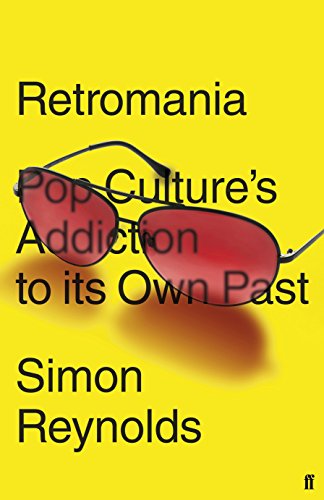
Retromania: Pop Culture's Addiction to its Own Past
Simon Reynolds, 02012
The first book to make sense of 21st Century pop, Retromania explores rock's nostalgia industry of revivals, reissues, reunions and remakes, and argues that there has never before been a culture so obsessed with its own immediate past.

Retromania: Pop Culture's Addiction to its Own Past
Simon Reynolds, 02012
The first book to make sense of 21st Century pop, Retromania explores rock's nostalgia industry of revivals, reissues, reunions and remakes, and argues that there has never before been a culture so obsessed with its own immediate past.

Retromania: Pop Culture's Addiction to its Own Past
Simon Reynolds, 02012
The first book to make sense of 21st Century pop, Retromania explores rock's nostalgia industry of revivals, reissues, reunions and remakes, and argues that there has never before been a culture so obsessed with its own immediate past.
Commerce

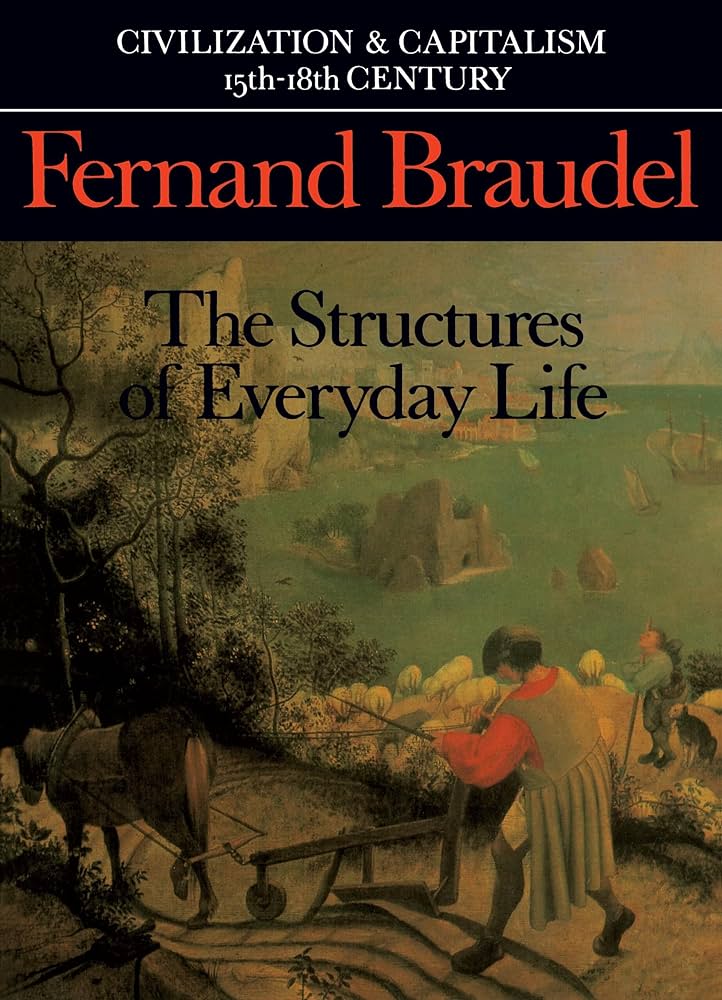
Civilization and Capitalism
Fernand Braudel, 01982
By examining in detail the material life of pre-industrial peoples around the world, Fernand Braudel significantly changed the way historians view their subject. Volume I describes food and drink, dress and housing, demography and family structure, energy and technology, money and credit, and the growth of towns.

Civilization and Capitalism
Fernand Braudel, 01982
By examining in detail the material life of pre-industrial peoples around the world, Fernand Braudel significantly changed the way historians view their subject. Volume I describes food and drink, dress and housing, demography and family structure, energy and technology, money and credit, and the growth of towns.

Civilization and Capitalism
Fernand Braudel, 01982
By examining in detail the material life of pre-industrial peoples around the world, Fernand Braudel significantly changed the way historians view their subject. Volume I describes food and drink, dress and housing, demography and family structure, energy and technology, money and credit, and the growth of towns.

The Master Switch: The Rise and Fall of Information Empires
Tim Wu, 02012
The Internet Age: on the face of it, an era of unprecedented freedom in both communication and culture. Yet in the past, each major new medium, from telephone to satellite television, has crested on a wave of similar idealistic optimism, before succumbing to the inevitable undertow of industrial consolidation. Every once free and open technology has, in time, become centralized and closed; as corporate power has taken control of the 'master switch.' Today a similar struggle looms over the Internet, and as it increasingly supersedes all other media the stakes have never been higher.

The Master Switch: The Rise and Fall of Information Empires
Tim Wu, 02012
The Internet Age: on the face of it, an era of unprecedented freedom in both communication and culture. Yet in the past, each major new medium, from telephone to satellite television, has crested on a wave of similar idealistic optimism, before succumbing to the inevitable undertow of industrial consolidation. Every once free and open technology has, in time, become centralized and closed; as corporate power has taken control of the 'master switch.' Today a similar struggle looms over the Internet, and as it increasingly supersedes all other media the stakes have never been higher.

The Master Switch: The Rise and Fall of Information Empires
Tim Wu, 02012
The Internet Age: on the face of it, an era of unprecedented freedom in both communication and culture. Yet in the past, each major new medium, from telephone to satellite television, has crested on a wave of similar idealistic optimism, before succumbing to the inevitable undertow of industrial consolidation. Every once free and open technology has, in time, become centralized and closed; as corporate power has taken control of the 'master switch.' Today a similar struggle looms over the Internet, and as it increasingly supersedes all other media the stakes have never been higher.
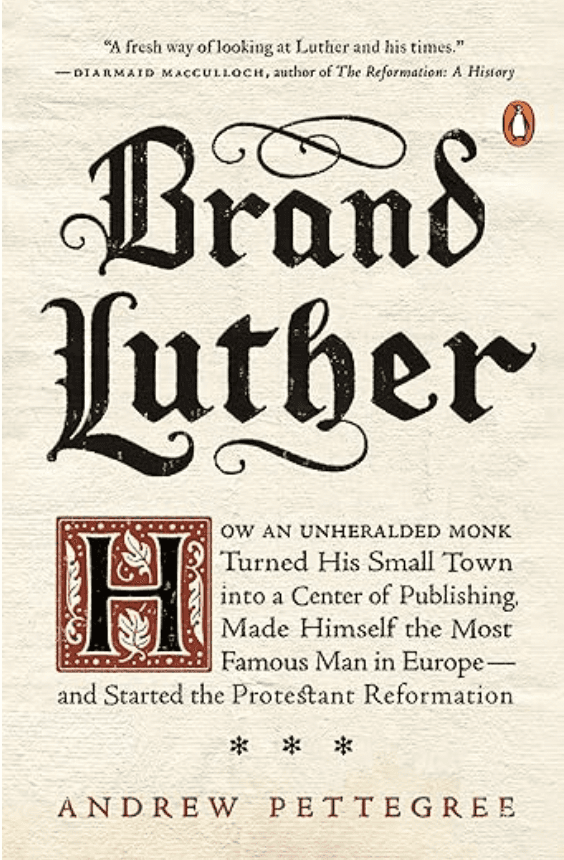
Brand Luther: How an Unheralded Monk Turned His Small Town into a Center of Publishing, Made Himself the Most Famous Man in Europe--and Started the Protestant Reformation
Andrew Pettegree, 02016
Historian Andrew Pettegree illustrates Luther's great gifts not simply as a theologian, but as a communicator - indeed, as the world's first mass-media figure; its first brand. Luther recognized in printing the power of pamphlets, written in the colloquial German of everyday people, to win the battle of ideas. With businessman Lucas Cranach he created a product that spread like wildfire. Soon Germany was overwhelmed by a blizzard of pamphlets and the Reformation itself would blaze on for more than a century.

Brand Luther: How an Unheralded Monk Turned His Small Town into a Center of Publishing, Made Himself the Most Famous Man in Europe--and Started the Protestant Reformation
Andrew Pettegree, 02016
Historian Andrew Pettegree illustrates Luther's great gifts not simply as a theologian, but as a communicator - indeed, as the world's first mass-media figure; its first brand. Luther recognized in printing the power of pamphlets, written in the colloquial German of everyday people, to win the battle of ideas. With businessman Lucas Cranach he created a product that spread like wildfire. Soon Germany was overwhelmed by a blizzard of pamphlets and the Reformation itself would blaze on for more than a century.

Brand Luther: How an Unheralded Monk Turned His Small Town into a Center of Publishing, Made Himself the Most Famous Man in Europe--and Started the Protestant Reformation
Andrew Pettegree, 02016
Historian Andrew Pettegree illustrates Luther's great gifts not simply as a theologian, but as a communicator - indeed, as the world's first mass-media figure; its first brand. Luther recognized in printing the power of pamphlets, written in the colloquial German of everyday people, to win the battle of ideas. With businessman Lucas Cranach he created a product that spread like wildfire. Soon Germany was overwhelmed by a blizzard of pamphlets and the Reformation itself would blaze on for more than a century.
Infrastructure


Roads to Power: Britain Invents the Infrastructure State
Jo Guldi, 02012
In Roads to Power, Jo Guldi refutes the traditional tale of how better roads made better neighbors and how the transport revolution unified the English, Scottish, Welsh, and Irish into a common and commercial people.

Roads to Power: Britain Invents the Infrastructure State
Jo Guldi, 02012
In Roads to Power, Jo Guldi refutes the traditional tale of how better roads made better neighbors and how the transport revolution unified the English, Scottish, Welsh, and Irish into a common and commercial people.

Roads to Power: Britain Invents the Infrastructure State
Jo Guldi, 02012
In Roads to Power, Jo Guldi refutes the traditional tale of how better roads made better neighbors and how the transport revolution unified the English, Scottish, Welsh, and Irish into a common and commercial people.
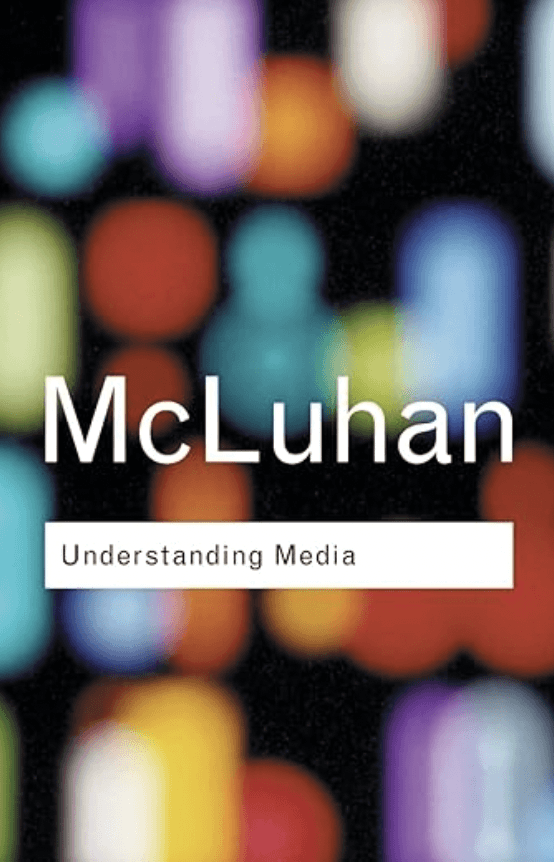
Understanding Media: The Extensions of Man
Marshall McLuhan, 01969
In the 1960s McLuhan’s theories aroused both wrath and admiration. It is intriguing to speculate what he might have to say 40 years later on subjects to which he devoted whole chapters such as Television, The Telephone, Weapons, Housing and Money. Today few would dispute that mass media have indeed decentralized modern living and turned the world into a global village.

Understanding Media: The Extensions of Man
Marshall McLuhan, 01969
In the 1960s McLuhan’s theories aroused both wrath and admiration. It is intriguing to speculate what he might have to say 40 years later on subjects to which he devoted whole chapters such as Television, The Telephone, Weapons, Housing and Money. Today few would dispute that mass media have indeed decentralized modern living and turned the world into a global village.

Understanding Media: The Extensions of Man
Marshall McLuhan, 01969
In the 1960s McLuhan’s theories aroused both wrath and admiration. It is intriguing to speculate what he might have to say 40 years later on subjects to which he devoted whole chapters such as Television, The Telephone, Weapons, Housing and Money. Today few would dispute that mass media have indeed decentralized modern living and turned the world into a global village.
Governance

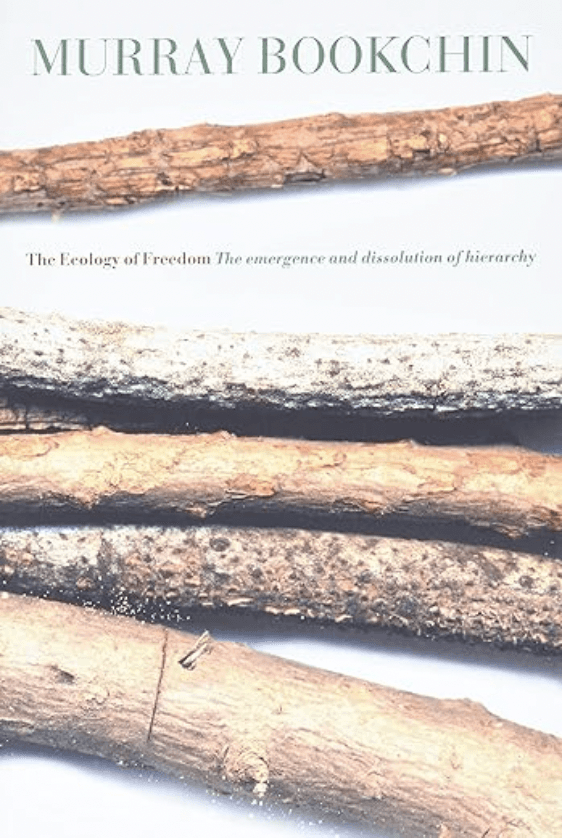
The Ecology of Freedom: The Emergence and Dissolution of Hierarchy
Murray Bookchin, 02005
Using a synthesis of ecology, anthropology, philosophy and political theory, this book traces our society's conflicting legacies of freedom and domination, from the first emergence of human culture to today's global capitalism. The theme of Murray Bookchin's grand historical narrative is straightforward: environmental, economic and political devastation are born at the moment that human societies begin to organize themselves hierarchically.

The Ecology of Freedom: The Emergence and Dissolution of Hierarchy
Murray Bookchin, 02005
Using a synthesis of ecology, anthropology, philosophy and political theory, this book traces our society's conflicting legacies of freedom and domination, from the first emergence of human culture to today's global capitalism. The theme of Murray Bookchin's grand historical narrative is straightforward: environmental, economic and political devastation are born at the moment that human societies begin to organize themselves hierarchically.

The Ecology of Freedom: The Emergence and Dissolution of Hierarchy
Murray Bookchin, 02005
Using a synthesis of ecology, anthropology, philosophy and political theory, this book traces our society's conflicting legacies of freedom and domination, from the first emergence of human culture to today's global capitalism. The theme of Murray Bookchin's grand historical narrative is straightforward: environmental, economic and political devastation are born at the moment that human societies begin to organize themselves hierarchically.
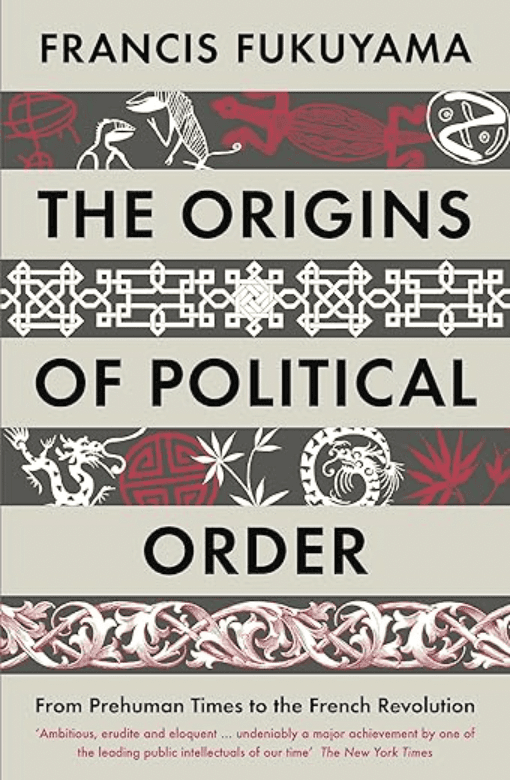
The Origins of Political Order: From Prehuman Times to the French Revolution
Francis Fukuyama, 02011
Nations are not trapped by their pasts, but events that happened hundreds or even thousands of years ago continue to exert huge influence on present-day politics. If we are to understand the politics that we now take for granted, we need to understand its origins. The Origins of Political Order is a magisterial study on the emergence of mankind as a political animal, by one of the most eminent political thinkers writing today.

The Origins of Political Order: From Prehuman Times to the French Revolution
Francis Fukuyama, 02011
Nations are not trapped by their pasts, but events that happened hundreds or even thousands of years ago continue to exert huge influence on present-day politics. If we are to understand the politics that we now take for granted, we need to understand its origins. The Origins of Political Order is a magisterial study on the emergence of mankind as a political animal, by one of the most eminent political thinkers writing today.

The Origins of Political Order: From Prehuman Times to the French Revolution
Francis Fukuyama, 02011
Nations are not trapped by their pasts, but events that happened hundreds or even thousands of years ago continue to exert huge influence on present-day politics. If we are to understand the politics that we now take for granted, we need to understand its origins. The Origins of Political Order is a magisterial study on the emergence of mankind as a political animal, by one of the most eminent political thinkers writing today.
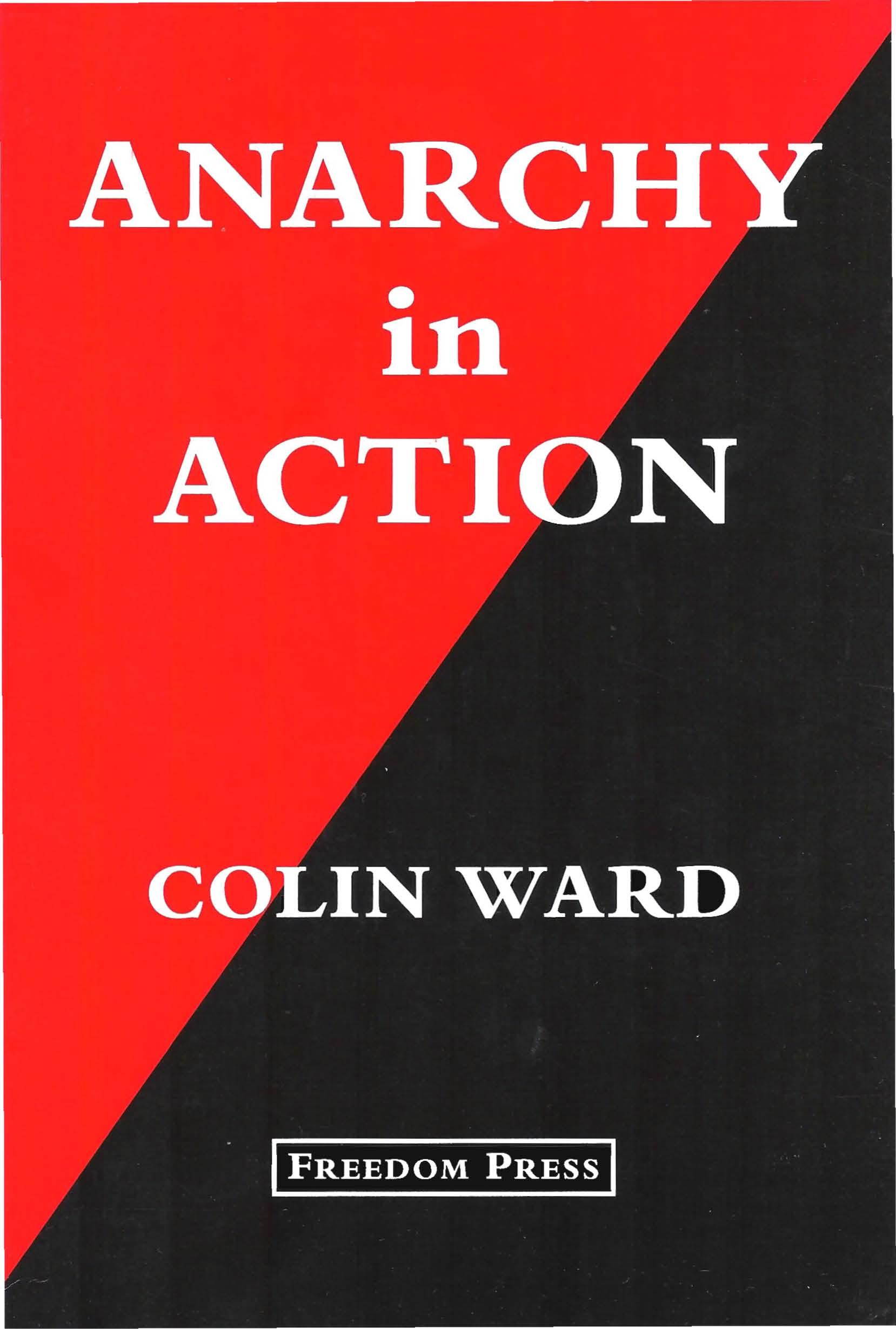
Anarchy in Action
Colin Ward, 01973
The argument of this book is that an anarchist society, a society which organises itself without authority, is always in existence. Through a wide-ranging analysis - drawing on examples from education, urban planning, welfare, housing, the environment, the workplace, and the family, to name but a few.

Anarchy in Action
Colin Ward, 01973
The argument of this book is that an anarchist society, a society which organises itself without authority, is always in existence. Through a wide-ranging analysis - drawing on examples from education, urban planning, welfare, housing, the environment, the workplace, and the family, to name but a few.

Anarchy in Action
Colin Ward, 01973
The argument of this book is that an anarchist society, a society which organises itself without authority, is always in existence. Through a wide-ranging analysis - drawing on examples from education, urban planning, welfare, housing, the environment, the workplace, and the family, to name but a few.
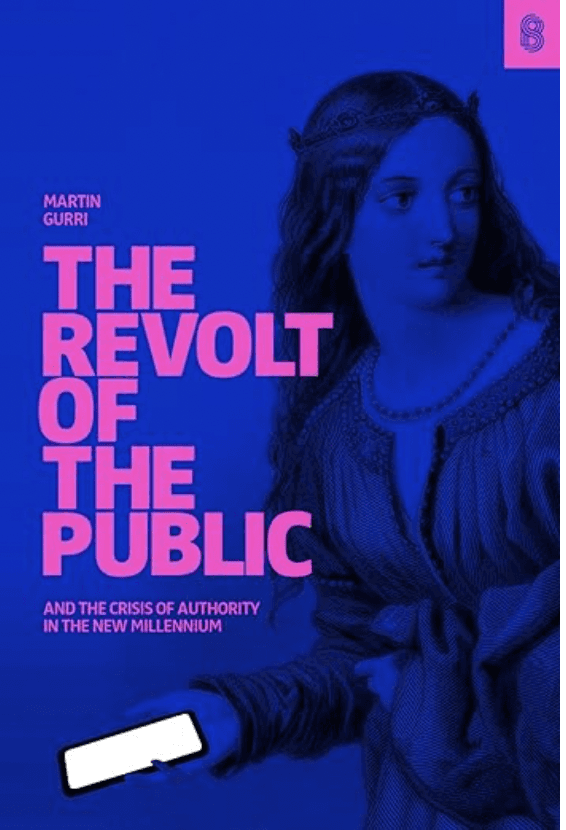
The Revolt of The Public and the Crisis of Authority in the New Millennium
Martin Gurri, 02014
Technology has categorically reversed the information balance of power between the public and the elites who manage the great hierarchical institutions of the industrial age: government, political parties, the media. The Revolt of the Public tells the story of how insurgencies, enabled by digital devices and a vast information sphere, have mobilized millions of ordinary people around the world. Originally published in 2014, The Revolt of the Public is now available in an updated edition, which includes an extensive analysis of Donald Trump’s improbable rise to the presidency and the electoral triumphs of Brexit

The Revolt of The Public and the Crisis of Authority in the New Millennium
Martin Gurri, 02014
Technology has categorically reversed the information balance of power between the public and the elites who manage the great hierarchical institutions of the industrial age: government, political parties, the media. The Revolt of the Public tells the story of how insurgencies, enabled by digital devices and a vast information sphere, have mobilized millions of ordinary people around the world. Originally published in 2014, The Revolt of the Public is now available in an updated edition, which includes an extensive analysis of Donald Trump’s improbable rise to the presidency and the electoral triumphs of Brexit

The Revolt of The Public and the Crisis of Authority in the New Millennium
Martin Gurri, 02014
Technology has categorically reversed the information balance of power between the public and the elites who manage the great hierarchical institutions of the industrial age: government, political parties, the media. The Revolt of the Public tells the story of how insurgencies, enabled by digital devices and a vast information sphere, have mobilized millions of ordinary people around the world. Originally published in 2014, The Revolt of the Public is now available in an updated edition, which includes an extensive analysis of Donald Trump’s improbable rise to the presidency and the electoral triumphs of Brexit
Culture

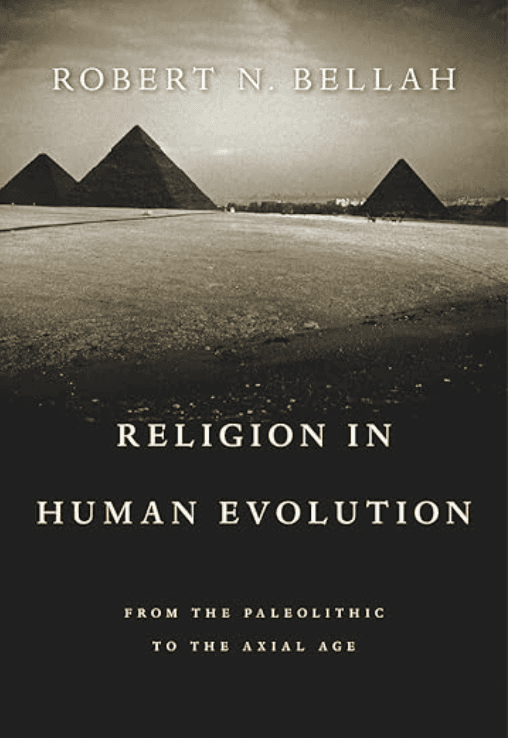
Religion in Human Evolution: From the Paleolithic to the Axial Age
Robert N. Bellah, 02017
Religion in Human Evolution is a work of extraordinary ambition―a wide-ranging, nuanced probing of our biological past to discover the kinds of lives that human beings have most often imagined were worth living. It offers what is frequently seen as a forbidden theory of the origin of religion that goes deep into evolution, especially but not exclusively cultural evolution.

Religion in Human Evolution: From the Paleolithic to the Axial Age
Robert N. Bellah, 02017
Religion in Human Evolution is a work of extraordinary ambition―a wide-ranging, nuanced probing of our biological past to discover the kinds of lives that human beings have most often imagined were worth living. It offers what is frequently seen as a forbidden theory of the origin of religion that goes deep into evolution, especially but not exclusively cultural evolution.

Religion in Human Evolution: From the Paleolithic to the Axial Age
Robert N. Bellah, 02017
Religion in Human Evolution is a work of extraordinary ambition―a wide-ranging, nuanced probing of our biological past to discover the kinds of lives that human beings have most often imagined were worth living. It offers what is frequently seen as a forbidden theory of the origin of religion that goes deep into evolution, especially but not exclusively cultural evolution.
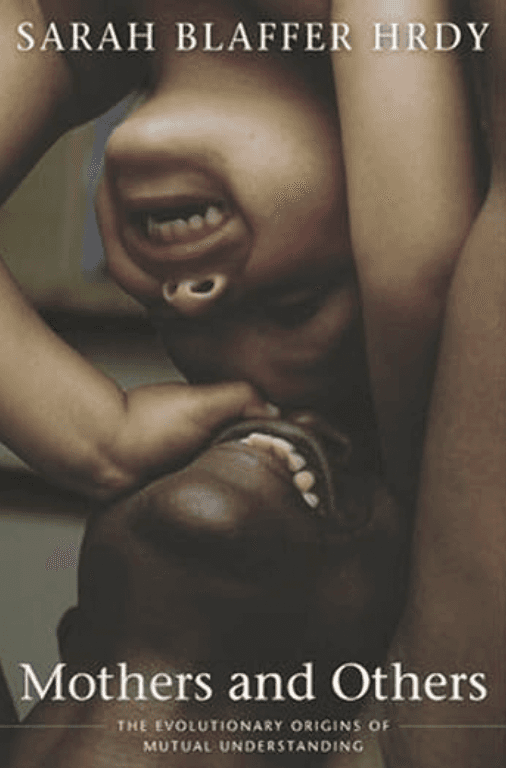
Mothers and Others: The Evolutionary Origins of Mutual Understanding
Sarah Blaffer Hrdy, 02011
Somewhere in Africa, more than a million years ago, a line of apes began to rear their young differently than their Great Ape ancestors. From this new form of care came new ways of engaging and understanding each other. How such singular human capacities evolved, and how they have kept us alive for thousands of generations, is the mystery revealed in this bold and wide-ranging new vision of human emotional evolution.

Mothers and Others: The Evolutionary Origins of Mutual Understanding
Sarah Blaffer Hrdy, 02011
Somewhere in Africa, more than a million years ago, a line of apes began to rear their young differently than their Great Ape ancestors. From this new form of care came new ways of engaging and understanding each other. How such singular human capacities evolved, and how they have kept us alive for thousands of generations, is the mystery revealed in this bold and wide-ranging new vision of human emotional evolution.

Mothers and Others: The Evolutionary Origins of Mutual Understanding
Sarah Blaffer Hrdy, 02011
Somewhere in Africa, more than a million years ago, a line of apes began to rear their young differently than their Great Ape ancestors. From this new form of care came new ways of engaging and understanding each other. How such singular human capacities evolved, and how they have kept us alive for thousands of generations, is the mystery revealed in this bold and wide-ranging new vision of human emotional evolution.
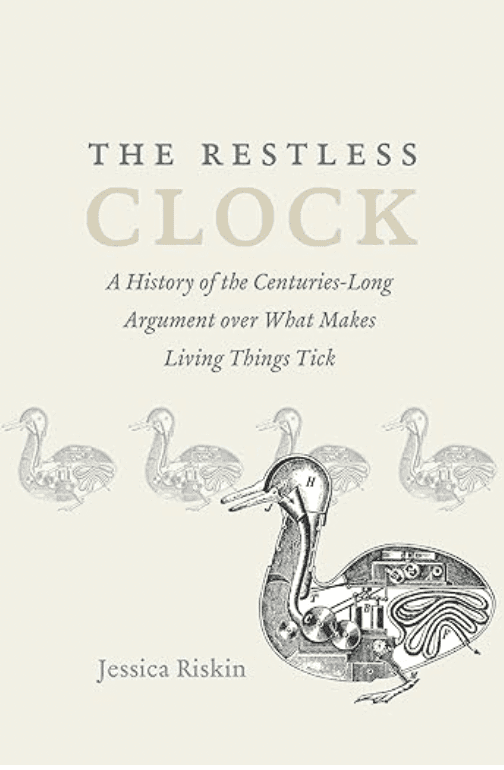
The Restless Clock: A History of the Centuries–Long Argument over What Makes Living Things Tick
Jessica Riskin, 02022
Since the seventeenth century, many thinkers have made agency, in various forms, central to science. The Restless Clock examines the history of this principle, banning agency, in the life sciences. It also tells the story of dissenters embracing the opposite idea: that agency is essential to nature. The story begins with the automata of early modern Europe, as models for the new science of living things, and traces questions of science and agency through Descartes, Leibniz, Lamarck, and Darwin, among many others.

The Restless Clock: A History of the Centuries–Long Argument over What Makes Living Things Tick
Jessica Riskin, 02022
Since the seventeenth century, many thinkers have made agency, in various forms, central to science. The Restless Clock examines the history of this principle, banning agency, in the life sciences. It also tells the story of dissenters embracing the opposite idea: that agency is essential to nature. The story begins with the automata of early modern Europe, as models for the new science of living things, and traces questions of science and agency through Descartes, Leibniz, Lamarck, and Darwin, among many others.

The Restless Clock: A History of the Centuries–Long Argument over What Makes Living Things Tick
Jessica Riskin, 02022
Since the seventeenth century, many thinkers have made agency, in various forms, central to science. The Restless Clock examines the history of this principle, banning agency, in the life sciences. It also tells the story of dissenters embracing the opposite idea: that agency is essential to nature. The story begins with the automata of early modern Europe, as models for the new science of living things, and traces questions of science and agency through Descartes, Leibniz, Lamarck, and Darwin, among many others.
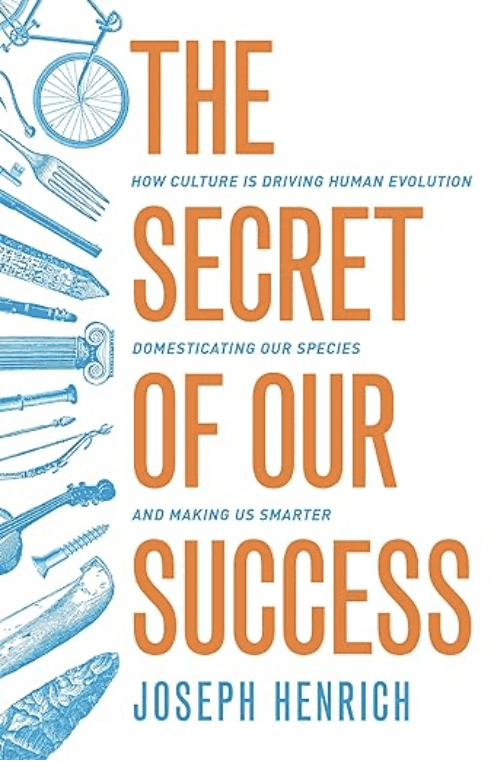
The Secret of Our Success: How Culture is Driving Human Evolution, Domesticating Our Species, and Making Us Smarter
Joseph Henrich, 02017
What has enabled us to dominate the globe, more than any other species, while remaining virtually helpless as lone individuals? This book shows that the secret of our success lies not in our innate intelligence, but in our collective brains--on the ability of human groups to socially interconnect and learn from one another over generations.

The Secret of Our Success: How Culture is Driving Human Evolution, Domesticating Our Species, and Making Us Smarter
Joseph Henrich, 02017
What has enabled us to dominate the globe, more than any other species, while remaining virtually helpless as lone individuals? This book shows that the secret of our success lies not in our innate intelligence, but in our collective brains--on the ability of human groups to socially interconnect and learn from one another over generations.

The Secret of Our Success: How Culture is Driving Human Evolution, Domesticating Our Species, and Making Us Smarter
Joseph Henrich, 02017
What has enabled us to dominate the globe, more than any other species, while remaining virtually helpless as lone individuals? This book shows that the secret of our success lies not in our innate intelligence, but in our collective brains--on the ability of human groups to socially interconnect and learn from one another over generations.
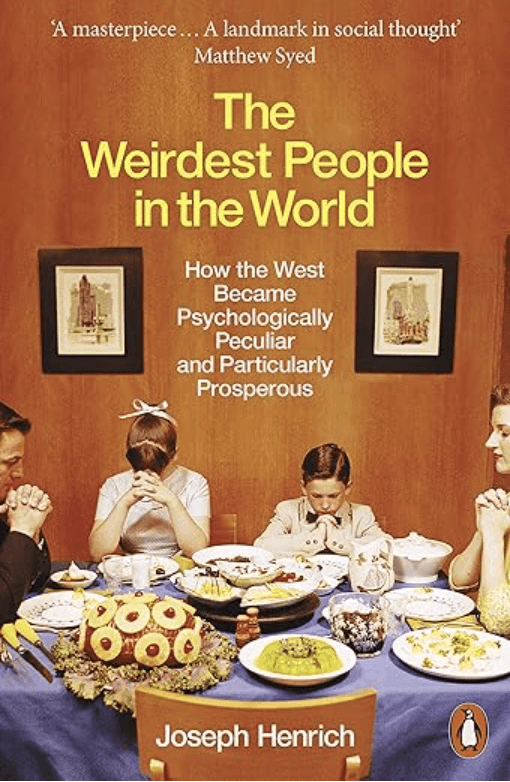
The Weirdest People in the World: How the West Became Psychologically Peculiar and Particularly Prosperous
Joseph Henrich, 02020
Unlike most who have ever lived, WEIRD people are highly individualistic, nonconformist, analytical and control-oriented. How did WEIRD populations become so psychologically peculiar? What part did these differences play in our history, and what do they mean for our collective identity? Joseph Henrich, who developed the game-changing concept of WEIRD, uses leading-edge research in anthropology, psychology, economics and evolutionary biology to explore how changing family structures, marriage practices and religious beliefs in the Middle Ages shaped the Western mind, laying the foundations for the world we know today.

The Weirdest People in the World: How the West Became Psychologically Peculiar and Particularly Prosperous
Joseph Henrich, 02020
Unlike most who have ever lived, WEIRD people are highly individualistic, nonconformist, analytical and control-oriented. How did WEIRD populations become so psychologically peculiar? What part did these differences play in our history, and what do they mean for our collective identity? Joseph Henrich, who developed the game-changing concept of WEIRD, uses leading-edge research in anthropology, psychology, economics and evolutionary biology to explore how changing family structures, marriage practices and religious beliefs in the Middle Ages shaped the Western mind, laying the foundations for the world we know today.

The Weirdest People in the World: How the West Became Psychologically Peculiar and Particularly Prosperous
Joseph Henrich, 02020
Unlike most who have ever lived, WEIRD people are highly individualistic, nonconformist, analytical and control-oriented. How did WEIRD populations become so psychologically peculiar? What part did these differences play in our history, and what do they mean for our collective identity? Joseph Henrich, who developed the game-changing concept of WEIRD, uses leading-edge research in anthropology, psychology, economics and evolutionary biology to explore how changing family structures, marriage practices and religious beliefs in the Middle Ages shaped the Western mind, laying the foundations for the world we know today.
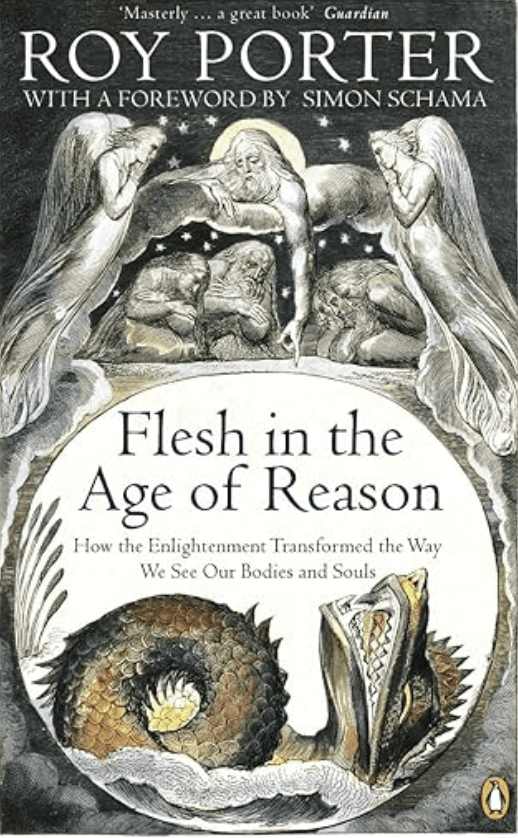
Flesh in the Age of Reason
Roy Porter, 02003
The gloomy, anguished fears and concerns of the great English writers of the Civil War period (Milton, Bunyan et all) are in many ways completely baffling and alien to us and yet 150 years later with writers such as Byron we feel totally at home with their view of the world. How did this extraordinary change happen? How did we become modern? In this sequel to the prize-winning "Enlightenment", Roy Porter completes his lifetime's work, offering an account of the writings of some of the most attractive figures ever to write in English.

Flesh in the Age of Reason
Roy Porter, 02003
The gloomy, anguished fears and concerns of the great English writers of the Civil War period (Milton, Bunyan et all) are in many ways completely baffling and alien to us and yet 150 years later with writers such as Byron we feel totally at home with their view of the world. How did this extraordinary change happen? How did we become modern? In this sequel to the prize-winning "Enlightenment", Roy Porter completes his lifetime's work, offering an account of the writings of some of the most attractive figures ever to write in English.

Flesh in the Age of Reason
Roy Porter, 02003
The gloomy, anguished fears and concerns of the great English writers of the Civil War period (Milton, Bunyan et all) are in many ways completely baffling and alien to us and yet 150 years later with writers such as Byron we feel totally at home with their view of the world. How did this extraordinary change happen? How did we become modern? In this sequel to the prize-winning "Enlightenment", Roy Porter completes his lifetime's work, offering an account of the writings of some of the most attractive figures ever to write in English.
Nature

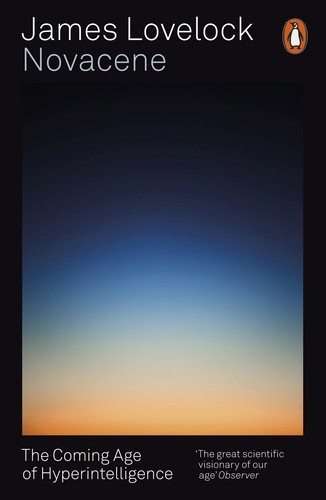
Novacene: The Coming Age of Hyperintelligence
James Lovelock, 02019
James Lovelock, creator of the Gaia hypothesis and the greatest environmental thinker of our time, has produced an astounding new theory about future of life on Earth. He argues that the anthropocene - the age in which humans acquired planetary-scale technologies - is, after 300 years, coming to an end. A new age - the novacene - has already begun.

Novacene: The Coming Age of Hyperintelligence
James Lovelock, 02019
James Lovelock, creator of the Gaia hypothesis and the greatest environmental thinker of our time, has produced an astounding new theory about future of life on Earth. He argues that the anthropocene - the age in which humans acquired planetary-scale technologies - is, after 300 years, coming to an end. A new age - the novacene - has already begun.

Novacene: The Coming Age of Hyperintelligence
James Lovelock, 02019
James Lovelock, creator of the Gaia hypothesis and the greatest environmental thinker of our time, has produced an astounding new theory about future of life on Earth. He argues that the anthropocene - the age in which humans acquired planetary-scale technologies - is, after 300 years, coming to an end. A new age - the novacene - has already begun.
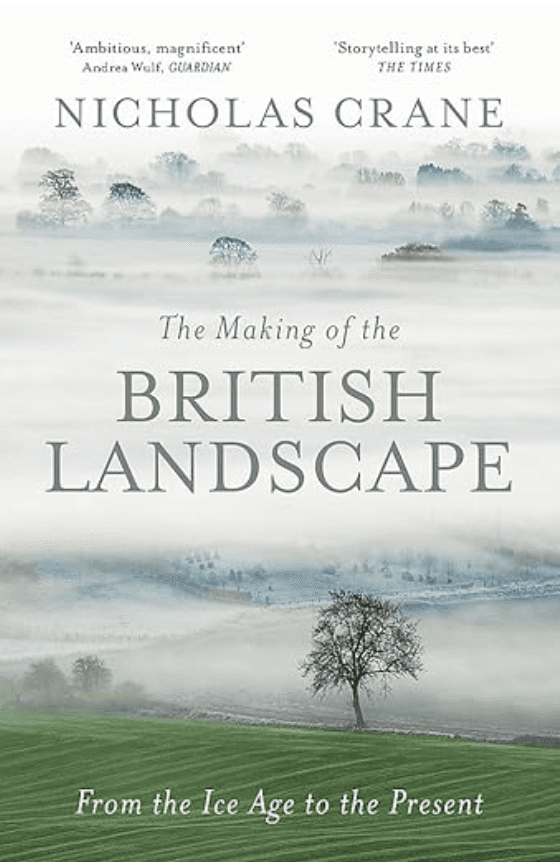
The Making Of The British Landscape: From the Ice Age to the Present
Nicholas Crane, 02017
The British landscape has been continuously occupied by humans for 12,000 years, from the end of the Ice Age till the twenty-first century. It has been transformed from a European peninsula of glacier and tundra to an island of glittering cities and exquisite countryside. In this geographical journey through time, we discover the ancient relationship between people and place and the deep-rooted tensions between town and countryside.

The Making Of The British Landscape: From the Ice Age to the Present
Nicholas Crane, 02017
The British landscape has been continuously occupied by humans for 12,000 years, from the end of the Ice Age till the twenty-first century. It has been transformed from a European peninsula of glacier and tundra to an island of glittering cities and exquisite countryside. In this geographical journey through time, we discover the ancient relationship between people and place and the deep-rooted tensions between town and countryside.

The Making Of The British Landscape: From the Ice Age to the Present
Nicholas Crane, 02017
The British landscape has been continuously occupied by humans for 12,000 years, from the end of the Ice Age till the twenty-first century. It has been transformed from a European peninsula of glacier and tundra to an island of glittering cities and exquisite countryside. In this geographical journey through time, we discover the ancient relationship between people and place and the deep-rooted tensions between town and countryside.
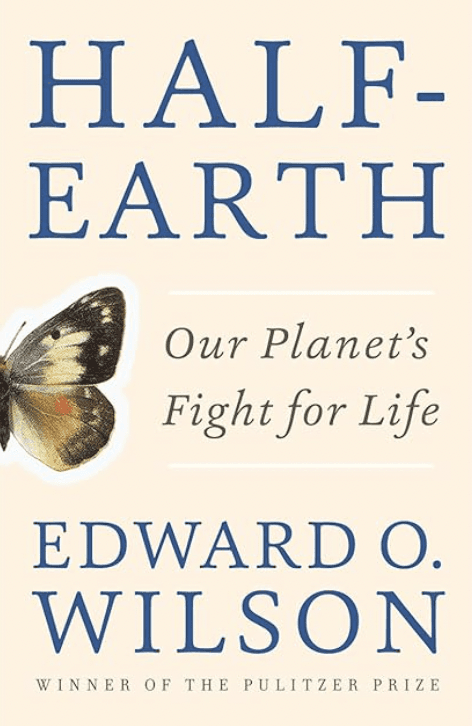
Half-Earth: Our Planet's Fight for Life
Edward O. Wilson, 02017
Angrily challenging the fashionable theories of Anthropocenes, who contend that humans can survive alone in an Edenic bubble engineered for their own survival, Wilson documents that the biosphere does not belong to us. Yet, refusing to believe that our extinction is, as so many fear, predetermined, Wilson has written Half-Earth as a cri de coeur, proposing that the only solution to our impending "Sixth Extinction" is to increase the area of natural reserves to half the surface of the earth. Suffused with a profound Darwinian understanding of our planet's fragility, Half-Earth is a transformative work that reverberates with an urgency like few other books.

Half-Earth: Our Planet's Fight for Life
Edward O. Wilson, 02017
Angrily challenging the fashionable theories of Anthropocenes, who contend that humans can survive alone in an Edenic bubble engineered for their own survival, Wilson documents that the biosphere does not belong to us. Yet, refusing to believe that our extinction is, as so many fear, predetermined, Wilson has written Half-Earth as a cri de coeur, proposing that the only solution to our impending "Sixth Extinction" is to increase the area of natural reserves to half the surface of the earth. Suffused with a profound Darwinian understanding of our planet's fragility, Half-Earth is a transformative work that reverberates with an urgency like few other books.

Half-Earth: Our Planet's Fight for Life
Edward O. Wilson, 02017
Angrily challenging the fashionable theories of Anthropocenes, who contend that humans can survive alone in an Edenic bubble engineered for their own survival, Wilson documents that the biosphere does not belong to us. Yet, refusing to believe that our extinction is, as so many fear, predetermined, Wilson has written Half-Earth as a cri de coeur, proposing that the only solution to our impending "Sixth Extinction" is to increase the area of natural reserves to half the surface of the earth. Suffused with a profound Darwinian understanding of our planet's fragility, Half-Earth is a transformative work that reverberates with an urgency like few other books.
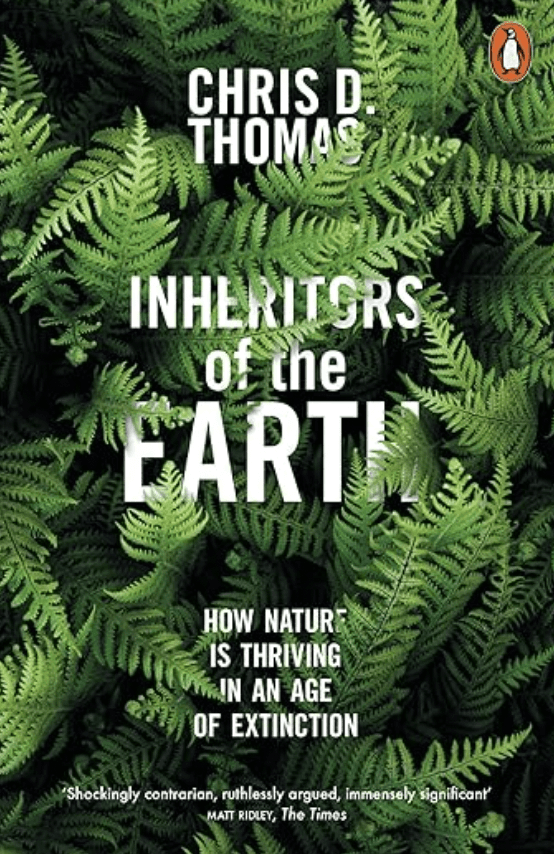
Inheritors of the Earth: How Nature Is Thriving in an Age of Extinction
Chris D. Thomas, 02017
It is accepted wisdom today that human beings have irrevocably damaged the natural world. Yet what if this narrative obscures a more hopeful truth? In Inheritors of the Earth, renowned ecologist and environmentalist Chris D. Thomas overturns the accepted story, revealing how nature is fighting back. Many animals and plants actually benefit from our presence, raising biological diversity in most parts of the world and increasing the rate at which new species are formed, perhaps to the highest level in Earth's history.

Inheritors of the Earth: How Nature Is Thriving in an Age of Extinction
Chris D. Thomas, 02017
It is accepted wisdom today that human beings have irrevocably damaged the natural world. Yet what if this narrative obscures a more hopeful truth? In Inheritors of the Earth, renowned ecologist and environmentalist Chris D. Thomas overturns the accepted story, revealing how nature is fighting back. Many animals and plants actually benefit from our presence, raising biological diversity in most parts of the world and increasing the rate at which new species are formed, perhaps to the highest level in Earth's history.

Inheritors of the Earth: How Nature Is Thriving in an Age of Extinction
Chris D. Thomas, 02017
It is accepted wisdom today that human beings have irrevocably damaged the natural world. Yet what if this narrative obscures a more hopeful truth? In Inheritors of the Earth, renowned ecologist and environmentalist Chris D. Thomas overturns the accepted story, revealing how nature is fighting back. Many animals and plants actually benefit from our presence, raising biological diversity in most parts of the world and increasing the rate at which new species are formed, perhaps to the highest level in Earth's history.
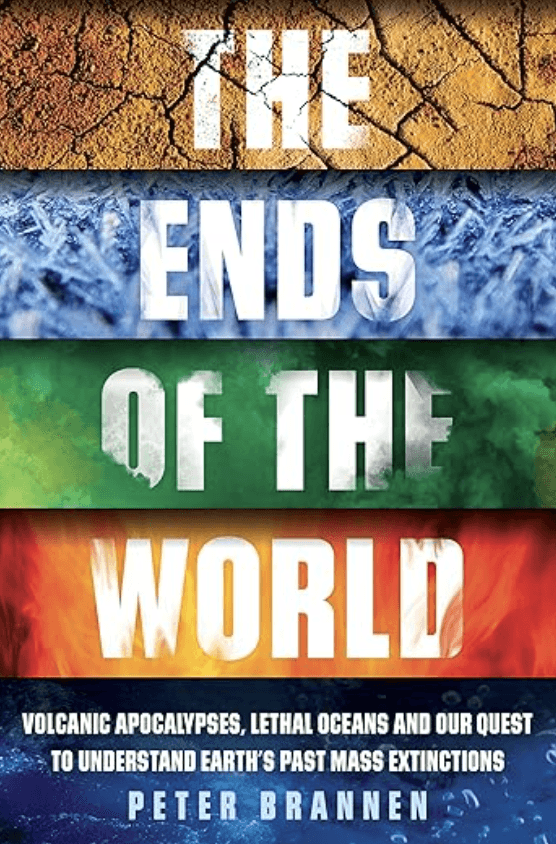
The Ends of the World: Volcanic Apocalypses, Lethal Oceans and Our Quest to Understand Earth’s Past Mass Extinctions
Peter Brannen, 02017
Death by fire, ice, poison gas, suffocation, asteroid. At five moments through history life on Earth was dragged to the very edge of extinction. Now, armed with revolutionary technology, scientists are uncovering clues about what caused these catastrophes. Deep-diving into past worlds of dragonflies the size of seagulls and fishes with guillotines for mouths, they explore how – against all the odds – life survived and what these ominous chapters can tell us about our future.

The Ends of the World: Volcanic Apocalypses, Lethal Oceans and Our Quest to Understand Earth’s Past Mass Extinctions
Peter Brannen, 02017
Death by fire, ice, poison gas, suffocation, asteroid. At five moments through history life on Earth was dragged to the very edge of extinction. Now, armed with revolutionary technology, scientists are uncovering clues about what caused these catastrophes. Deep-diving into past worlds of dragonflies the size of seagulls and fishes with guillotines for mouths, they explore how – against all the odds – life survived and what these ominous chapters can tell us about our future.

The Ends of the World: Volcanic Apocalypses, Lethal Oceans and Our Quest to Understand Earth’s Past Mass Extinctions
Peter Brannen, 02017
Death by fire, ice, poison gas, suffocation, asteroid. At five moments through history life on Earth was dragged to the very edge of extinction. Now, armed with revolutionary technology, scientists are uncovering clues about what caused these catastrophes. Deep-diving into past worlds of dragonflies the size of seagulls and fishes with guillotines for mouths, they explore how – against all the odds – life survived and what these ominous chapters can tell us about our future.
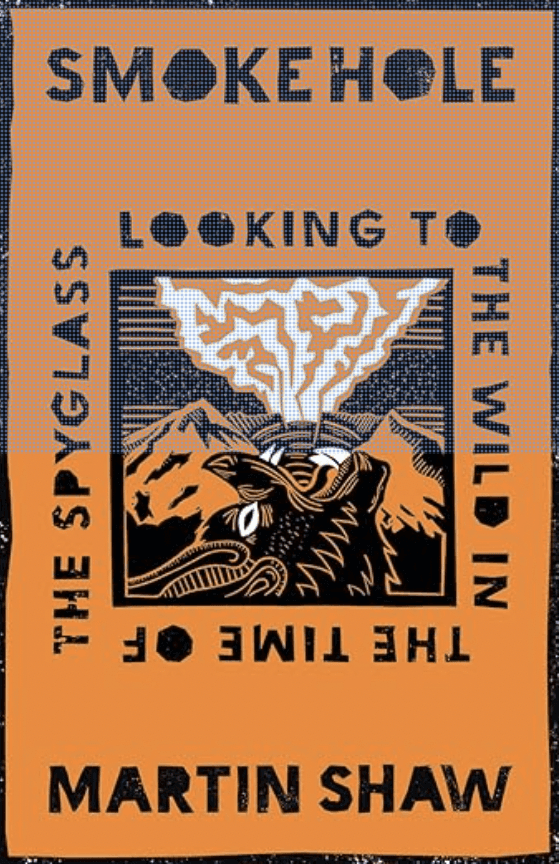
Smoke Hole: Looking to the Wild in the Time of the Spyglass
Martin Shaw, 02021
At a time when we are all confronted by not one, but many crossroads in our modern lives – identity, technology, trust, love, politics and a global pandemic – celebrated mythologist and author of Bardskull Martin Shaw delivers Smoke Hole: three metaphors to help us understand our world, one that is assailed by the seductive promises of social media and shadowed by a health crisis that has brought loneliness and isolation to an all-time high. We are losing our sense of direction, our sense of self. We have “networks”, not communities.

Smoke Hole: Looking to the Wild in the Time of the Spyglass
Martin Shaw, 02021
At a time when we are all confronted by not one, but many crossroads in our modern lives – identity, technology, trust, love, politics and a global pandemic – celebrated mythologist and author of Bardskull Martin Shaw delivers Smoke Hole: three metaphors to help us understand our world, one that is assailed by the seductive promises of social media and shadowed by a health crisis that has brought loneliness and isolation to an all-time high. We are losing our sense of direction, our sense of self. We have “networks”, not communities.

Smoke Hole: Looking to the Wild in the Time of the Spyglass
Martin Shaw, 02021
At a time when we are all confronted by not one, but many crossroads in our modern lives – identity, technology, trust, love, politics and a global pandemic – celebrated mythologist and author of Bardskull Martin Shaw delivers Smoke Hole: three metaphors to help us understand our world, one that is assailed by the seductive promises of social media and shadowed by a health crisis that has brought loneliness and isolation to an all-time high. We are losing our sense of direction, our sense of self. We have “networks”, not communities.
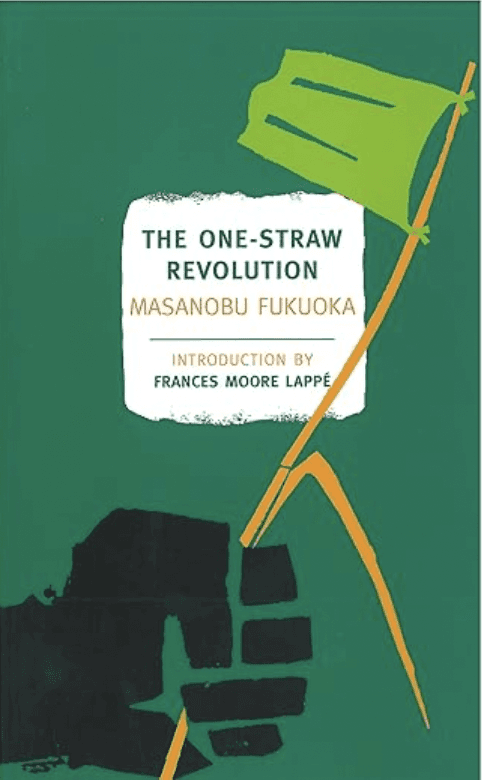
One Straw Revolution: Introduction to Natural Farming
Masanobu Fukuoka, 01992
By examining in detail the material life of pre-industrial peoples around the world, Fernand Braudel significantly changed the way historians view their subject. Volume I describes food and drink, dress and housing, demography and family structure, energy and technology, money and credit, and the growth of towns.

One Straw Revolution: Introduction to Natural Farming
Masanobu Fukuoka, 01992
By examining in detail the material life of pre-industrial peoples around the world, Fernand Braudel significantly changed the way historians view their subject. Volume I describes food and drink, dress and housing, demography and family structure, energy and technology, money and credit, and the growth of towns.











